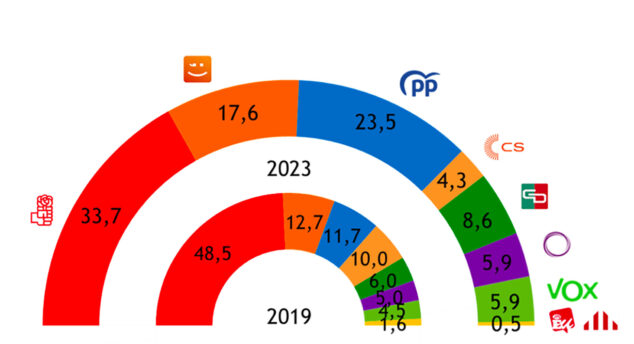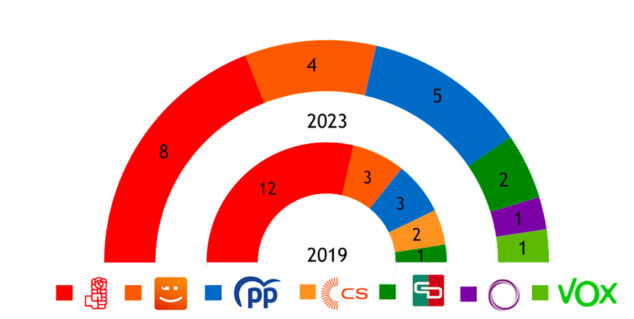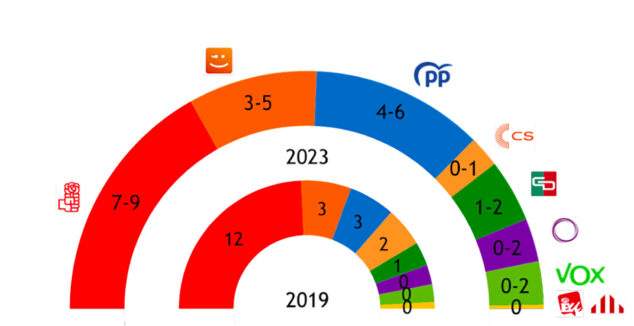In the analysis of the Dénia.com electoral poll, it comes to an end with the assessment of a voting intention that leaves several surprises. He PSPV-PSOE would win the Dénia elections, but without an absolute majority. Compromís would increase his support, although he would give up his second position to PP. Ciudadanos could be left without seats in the Dianense hemicycle for not exceeding the electoral barrier of 5%, a limit that VOX and Podemos would probably exceed.
➜ The Dénia candidates for the exam: which are the best and worst valued?
➜ PSPV, Compromís and PP are the parties that arouse the most sympathy in Dénia
➜ What are the best and worst rated matches?
➜ Favorite candidates for mayor of Dénia
Just over a week after the Dénia municipal elections, the PSPV-PSOE consolidates its first position as the most voted party, with 33,7% of the ballots, but its representation would decrease by 4 councilors, which would leave them without sufficient support to govern alone. This result is conditioned by a scant handful of votes, because, in addition to the fact that right now the Socialists would obtain the last councilor in the running (stealing it from the PP), three parties are on the wire of exceeding, or not, the electoral barrier of 5%: Ciudadanos, Podemos and VOX, also altering the number of councilors that the formation of Vicent Grimalt. Indeed, any dance of percentages could cause the Socialists to be left with 7 representatives.
Although several parties take advantage of the fall of the PSPV-PSOE to gain strength, there is no doubt that the great beneficiary would be the PP, which would achieve 5 representatives.
The party most affected by the current call to the polls would be Ciudadanos. The formation headed by Susana Mut to this day would not be able to maintain any of the two seats that she has had these 4 years. Although it is also true that among the people who will not vote, the party's evaluation rises, just as Susana's does among the undecided. With which a high turnout could ensure a seat in it.
Compromís would go from 12,7% to 17,6% of the votes, which would imply an increase of one councilor, which would not prevent him from relegating him to being the third political force in the capital of the Marina Alta.
The moderate increase in support that it experiences GD (from 6% to 8,6%) would be enough to once again enjoy 2 seats in the Dianense plenary hall, a privilege that he lost in the past elections.
Two ideologically opposed parties would find themselves in the same situation: We can and VOX. Both were on the verge of obtaining representation 4 years ago, however, on this occasion it seems that they would be in a position to occupy 1 of the 21 positions that the local Council enjoys. Although, as we previously warned, a low number of votes could undermine their aspirations.
The new coalition between EUPV and ERPV he would be left out of the consistory, leaving in vain the hopes that by joining forces they would achieve representation.
The following graph shows the range of councilors taking into account the sample estimation error:
Transfer of votes between parties
- PSPV-PSOE: Of the three major parties, it is the one that retains the fewest votes from the previous votes (66 out of 100), and it does not achieve a high permeability with the rest of the formations either. In fact, with the former followers of Compromís, he obtained 3,4% of their ballots, with those of the PP 2,6% and with those of Gent of Dénia 3,2%. His result could have worsened if it were not for the fact that he mobilized a large number of voters who did not vote in the last elections, generating 6,3% of his current support.
- Commitments: It is the second party that retains the most voters in 2019 (74,1%). To this we must add that it manages to attract supporters of other parties, especially the PSPV-PSOE, but also the PP, Podemos and VOX, raising with them 16,8%, 3,3%, 1,6% and 1,7, 9% of your electoral building. In addition, although it does not manage to mobilize as many past abstentions as the PSPV-PSOE, 100 out of XNUMX Compromís ballots would come from this electoral market.
- PP: almost 3 out of 4 former voters of this formation revalidate the trust they were given in the last legislature. He manages to seize people who were related to the socialists, Ciudadanos, GD, VOX and Compromís, forming with them 25,2%, 13,7%, 2,3%, 1,3% and 3,2% of their electoral asset respectively. His influence over those who did not exercise their right to vote four years ago is more limited, but even so, he gathers 6,8% of his support in this way.
- Citizens: it fails to retain those who gave them their trust in 2019 (only 20%). To this we must add the fact that it barely manages to captivate sympathizers of other parties, only 1,9% and 3% of former socialists and popular ones, to create with them 16,7% and 6,5% of its current voting intention. Its result could have worsened if it were not for the fact that it managed to mobilize a bag of the population that did not vote in the previous elections, either because they were not registered in Dénia (up to generating 11,9% of its electorate) or because they abstained ( 24%).
- People from Dénia: it only retains 66,7% of the followers it had in 2019, but it channels part of the discontent of Ciudadanos (20%) and PSPV-PSOE (2,8%), generating an electoral capital of 18,6% and 12,9%, respectively. A part of those who did not vote, of their own free will, in the previous call to the polls allows him to configure 12,3% of his electoral spectrum.
- Can: it secures 71 out of every 100 voters, however, it fails to add disenchanted from other formations. Its great hook comes from young people who, by age, are voting for the first time and, to a lesser extent, from residents who have recently registered in the municipality, obtaining with them 44,2% and 8,7% of their ballots. .
- VOX: It has the most loyal followers, since 83,3% will once again opt for the green formation this year, but its appeal is very limited, since it only makes a dent in the previous PP electorate, swelling its ranks by 9,6%. It strengthens its consistorial representation thanks to people who did not vote in 2019, either because they did not want to do so or because they did not have the minimum age allowed (computing 17,8% and 22,4% of its current followers).
- Municipal Agreement: Its low weight in the polls does not allow drawing statistically reliable conclusions.
Profile of the electorate of Dénia
- The electorate of the PSPV-PSOE: They are people from a very wide demographic range ranging from 40 to 67 years old (with an average of 53), but with a marked presence of retirees and workers for others.
- Compromís voters: They are usually employed by others or students, from middle and young age cohorts between 30 and 45 years old, with an average of 39.
- Those who leaned towards the PP: They come from a demographic niche similar to that of the PSPV-PSOE, with the same mean (53 years) and a slightly narrower interquartile range (from 41 to 67 years), with large pockets of retired voters, self-employed workers and housewives.
- Regarding Citizens: its most common population spectrum is between 29 and 44 years. His average is 39 years.
- People from Dénia: It competes for a demographic space similar to that of the two-party formations, but with a more limited range of ages (between 45 and 61 years), and has a large representation of the unemployed and workers (both self-employed and others).
- The followers of Podemos: They are mostly students, younger than the rest (27 years on average), with a usual range that fluctuates between 19 and 32 years.
- VOX: It also finds its electoral ground among students, and therefore young people between the ages of 21 and 45, with an average of 36.
- Those who would not vote: They are women, in many cases students, of relatively young age, concentrated between 24 and 42 years of age.
- Those who have not decided the vote: They can be characterized as housewives, especially foreigners, placed in life cycles that range between 39 and 70 years (with an average of 54).
Methodology
- Universe of study: Residents of Dénia with the right to vote in the local elections of May 2023: 31.022 people (Source: CER, CERE and CERA. Electoral Census Office, INE May 2023).
- Confidence interval: 95,5%.
- Sampling: Personnel at a strategic point, random in the selection of the respondent and with control of quotas by age, sex and nationality.
- Field work: From May 8 to 16, 2023.
- Sample: 300 surveys.
- Maximum error of estimation for proportions:±5,75%










That's right, here we also have TEZANOS. buffff
Mr Grimalt
In the first plenary session, after achieving an absolute majority, he approved a transcendental measure for the future of Denka and the Danians.
RAISE YOUR SALARY BY 30%!!!
Can you vote for a similar hdp?
How heavy with the surveys are these of 300 people. It looks like paid advertising.